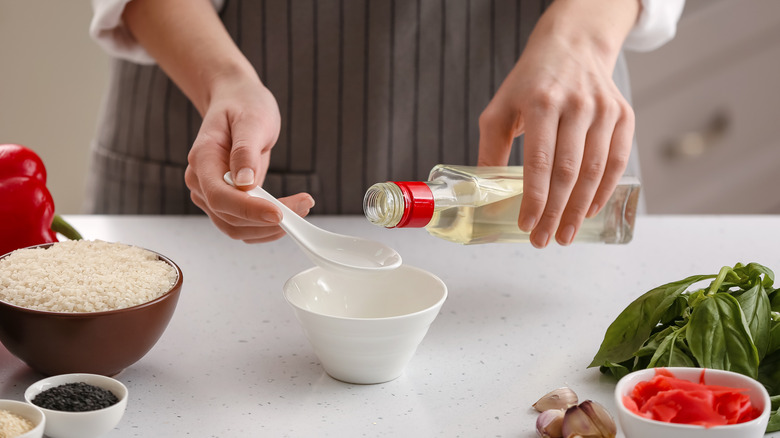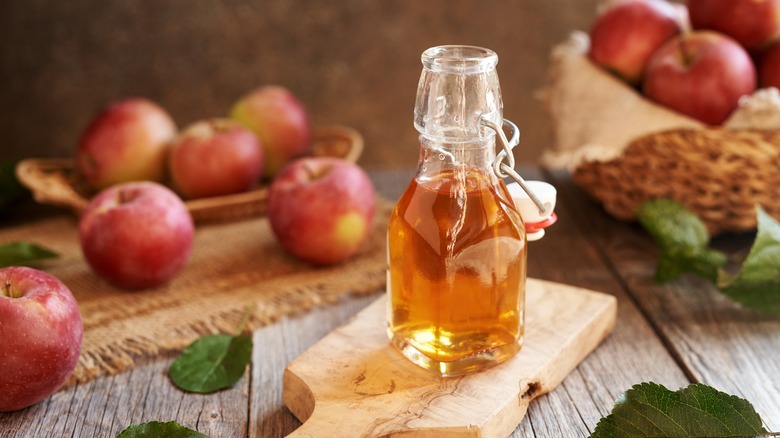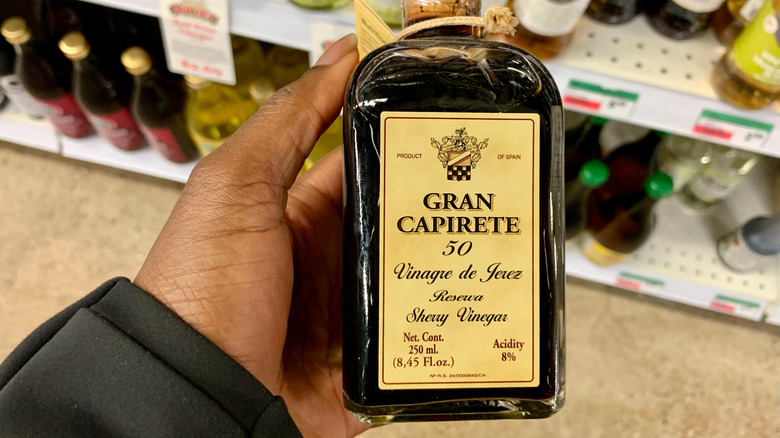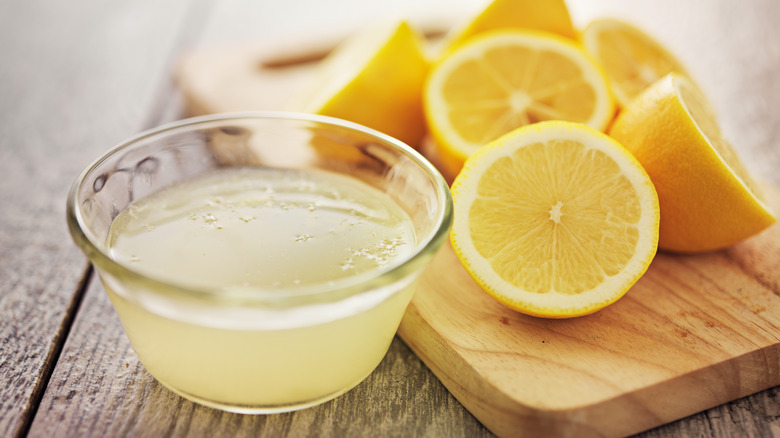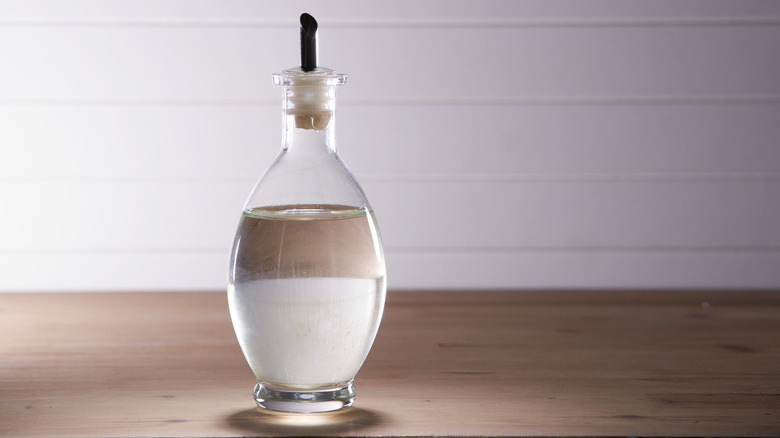5 Easy Ingredient Swaps For Rice Vinegar
Rice vinegar is one of the most common ingredients in Japanese cookery. You've probably encountered rice vinegar any time you've gone out for sushi, as it is a common seasoning in sushi rice (vinegar can make rice less sticky, so the sushi doesn't end up with a gummy texture). Outside of Japanese cuisine, however, it is a far less common ingredient, and it might not be the kind of thing you regularly keep in your pantry. If you find yourself needing a splash of rice vinegar for a recipe, but you have none on hand, fear not, as it's quite simple to substitute with another ingredient.
All types of vinegar, including rice vinegar, are made using the same basic method. To make vinegar, an alcoholic liquid, such as wine or cider, is fermented to the point that all the alcohol within it gets broken down into pungent acetic acid. Rice vinegar is made by fermenting rice wine (like mirin, which adds a touch of sweetness to scrambled eggs). Hence, it is sometimes labeled as rice wine vinegar. There are multiple varieties of rice vinegar, including black, brown, and red rice vinegar. However, the most common type is white rice vinegar. It is one of the more mild-tasting vinegars out there, and is sometimes seasoned with salt and sugar. To match this flavor profile as closely as possible, you should opt for another kind of vinegar that isn't too strong.
Apple cider vinegar should be your go-to substitute
Apple cider vinegar is the closest match to rice vinegar because it has a similar balance of acidity and sweetness. As you have probably guessed, apple cider vinegar is made by fermenting hard apple cider, and it does have a very faint hint of apple flavor to it. However, it is subtle enough that it shouldn't disrupt the intended flavor of whatever dish you are making.
Most rice wine vinegar contains about 4% to 5% acetic acid. Apple cider vinegar is slightly more acidic, at around 5% to 6% acetic acid, but this is a much closer match to rice vinegar than, say, white vinegar, which can vary dramatically, up to 7% acetic acid (it may not seem like much, but with acidic ingredients, every percentage point counts).
For culinary purposes, apple cider and rice vinegar are close enough alike that you can make a one-to-one substitution without changing anything. However, if the recipe you are using calls for seasoned rice vinegar, you'll want to add a pinch of salt and sugar to the apple cider vinegar before you use it, which will help to approximate the sweet-sour flavor profile of seasoned rice vinegar.
Champagne vinegar is your next best bet
If you don't have access to apple cider vinegar, there is another type of vinegar that you could use as a one-to-one substitute for rice vinegar. It's champagne vinegar, a beloved base for salad dressings due to its balanced flavor profile. This vinegar is made from fermented Champagne, and has a similarly mild flavor to rice vinegar.
Champagne vinegar is also nearly identical to rice vinegar in appearance. They are both clear and almost colorless, with just the faintest tan hue. Admittedly, champagne vinegar doesn't have quite the same sweetness that rice vinegar and apple cider vinegar do, but that really isn't an issue considering how mild champagne vinegar is. If you feel the vinegar is overly sour, a pinch of sugar should sort things out. While champagne vinegar does make a good all-around swap for rice vinegar, it's especially suited for pairing with seafood.
Sherry vinegar can work, depending on how much it's aged
Yet another type of vinegar you could substitute for rice vinegar is sherry vinegar. This is made from fermented sherry (a fortified wine from Spain similar to Port and Madeira). Like champagne vinegar and rice vinegar, sherry vinegar is a popular choice in salad dressings, and like those other two, sherry vinegar has a mellower tang than many other types of vinegar.
The flavor of sherry vinegar is more variable than most other types because it changes depending not only on the grapes used to make it, but also how long it ages. Some sherry vinegars are aged as much as 10 years, and they can get quite expensive. The cheaper ones actually make a much better substitute for rice vinegar though, as they have a similarly mild acidity. Heavily-aged sherry vinegars, on the other hand, will likely be too intense to effectively swap for rice vinegar.
Lemon juice will work in certain scenarios
You don't necessarily need to substitute rice vinegar with another type of vinegar. There are other acidic ingredients that you can use, namely lemon juice. This won't work on a simple one-to-one ratio like the other varieties of vinegar though. To perform this swap, you'll need to take whatever amount of rice vinegar your recipe calls for and double it. In other words, it's a two-to-one ratio of lemon juice to vinegar. Depending on the volume of vinegar called for, this ratio might leave you with more liquid than you really want in a recipe.
The biggest issue with swapping lemon juice for rice vinegar is that, while it can provide a similar level of acidity, lemon juice also has a distinct, fruity flavor and lacks the sweet notes found in rice vinegar. That's why lemon juice only works as a substitute for rice vinegar in certain situations. It's all good if you're making a marinade or salad dressing, but for sushi rice, the flavor just wouldn't be right.
If you only have white vinegar, add some sugar and water
What happens if the only type of vinegar you have on hand in your house is white vinegar? Don't worry, you can still make it work, it just takes a bit of kitchen trickery. As previously mentioned, white vinegar tends to be more acidic than rice vinegar, and it doesn't really have anything else to offer flavor-wise because it is made from neutral grain alcohol.
This would also be a good time to clarify that we're talking about distilled white vinegar, which is what you almost certainly have in your kitchen. Do not attempt using basic white vinegar, which has a stomach-churning 25% acidity and should only be used for cleaning.
To substitute distilled white vinegar for rice wine vinegar, you'll need to dilute it with a bit of water and add a pinch of sugar for that sweet factor. You don't need to use much. For a cup of white vinegar, a tablespoon or two of water and a teaspoon or so of plain white sugar should do the trick. You'll need to adjust it to taste however, so start by diluting the vinegar with just a splash of water and a tiny pinch of sugar, then taste and go from there.
